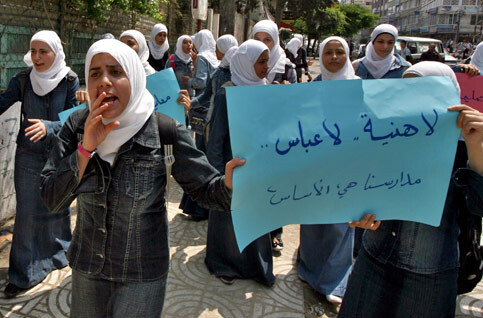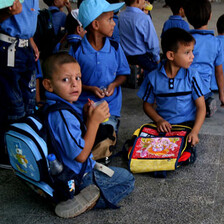Gaza Strip 6 November 2008

Palestinian school girls in Gaza City demonstrate against the teachers strike, September 2008. (Wissam Nassar/MaanImages)
As the rival Palestinian political parties are set to engage in serious national unity talks in Cairo, the factional divisions have also led to a series of strikes by workers in the public sector. For the past 16 months, the ruling Hamas party in Gaza and the Fatah party of Palestinian Authority President Mahmoud Abbas have been at odds. While Hamas has taken measures against Fatah in Gaza, in the West Bank the reverse has occurred.
Abbas ordered a boycott of Hamas after the Islamist party took over Gaza amidst fighting with Fatah in June 2007, demanding that employees of the public sector not deal with a Hamas-run government. The repercussions from this decision have already been observed throughout many public services, as more than 45,000 government employees have been sitting idle since last summer.
The past few months have witnessed strikes in the education and health sectors. According to Samir Imtair, Director General of the Hamas-run chamber of governmental employees, 4,000 teachers have gone on a strike since August. Although the Ramallah-based government has distanced itself from these strikes, arguing that it continues to pay the salaries of those striking and non-striking teachers, these actions were initiated by Ramallah-based institutions, like the public employees syndicate and the teachers union.
In August, the teachers union in the West Bank called on Gaza’s 16,000 teachers to strike against what the union termed “unfair transfers or appointments,” that the Hamas-run education ministry carried out before the beginning of this school year.
The Secretary General of the Palestinian teachers union, Jamil Shehada, explained that “Hamas has transferred or fired non-Hamas teachers and administrative staff at the various schools in Gaza, they have even taken over the premises of the teachers union in Gaza itself.”
“If they allege that their measures were fair and administrative, then why did they seize control of the teachers union in Gaza?” Shehada said.
The union’s secretary expressed resentment over those transfers and new appointments, calling on teachers to keep striking until the union’s demands are met, mainly Hamas reversing these new regulations at schools.
Yet, Dr. Mohammad Asqoul, Hamas’s Minister of Education in Gaza, defended the ministry’s actions as “legal” and necessary administrative measures that were unrelated to the political rivalry. He stated that “If we wanted to evaluate the strike from a professional basis, most of the demands are not related to the rights of the education sector’s workers. I can say that there are no problems on the ground, as there hasn’t been either excessive or inexcessive firing or transfer of those working in the education sector.”
At the Ahmad Shawqi “B” secondary school for girls, classrooms are run mostly by new teachers. Majda al-Atrash, the school’s principal, said that her school is now entirely dependent on new teachers, as only three of the original staff remained on duty because of the strike.
Shaima Ziyara a student in tenth-grade English class, explained in English that the new situation in the school was “kind of good, but they brought many good teachers for us to [fill] the empty places in the school and they teach us in a very good way, and some of them do not have enough experience for us, but they are good, almost good.” A number of other students echoed Ziyara’s sentiments, stating that education was too important to be entangled in politics.
It remains to be seen if the Cairo-hosted talks, slated for 10 November, will result in a national unity deal that preserves the Palestinians’ right to stable education and health systems. These rights and associated services will continue to be vital as the Israeli occupation continues to besiege Gaza while also expanding checkpoints and illegal settlements and constructing its wall in the West Bank.
Rami Almeghari is contributor to The Electronic Intifada, IMEMC.org and Free Speech Radio News. Rami is also a former senior English translator at and editor-in-chief of the international press center of the Gaza-based Palestinian Information Service. He can be contacted at rami_almeghari A T hotmail D O T com.
Related Links




